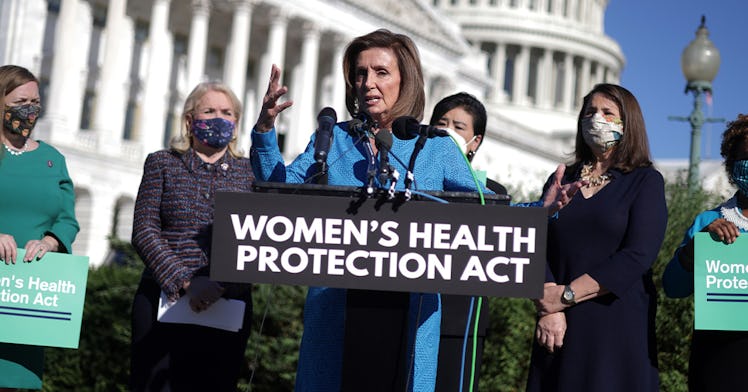A New Federal Abortion Bill Would Stop Most Statewide Bans. Will It Pass?
House Democrats passed the Women's Health Protection Act on Friday. But that may be all that happens with the landmark legislation.

After the state of Texas successfully passed SB 8, a bill that bans abortions at six weeks and empowers regular citizens to act as private bounty hunters and sue those who they think helped people get an abortion after that point, abortion rights have felt like they are under attack in a way that many advocates had not expected to happen so soon.
The Supreme Court declined to rule on the constitutionality of the law, and in doing so, essentially overturned Roe v. Wade. Other states are sure to follow suit and make it much harder for anyone to get an abortion and potentially financially disastrous for anyone who helps a person obtain an abortion. In response, the House Democrats pushed forward a bill to protect abortion rights federally. Sadly, though the bill passed, it seems like a lost cause.
Before September 1, 2021, abortions in Texas were permitted for up to 20 weeks. After that, pregnant people still had access to abortion if they could document a life-threatening medical condition to the expectant parent or the fetus had an abnormality not compatible with life.
However, that was struck down with SB 8, which categorizes the law as a civil violation, not a criminal ban. This essentially allowed for anyone to sue those who may have helped someone get an abortion – this includes medical professionals, cab drivers, friends, etc. As a result, the law was primarily advocated against by people who wished to protect abortion rights and other political leaders across the country.
On Sept 24, 2021, House Democrats shot back, approving legislation that aimed to protect abortion rights across the country. The House Democrats passed the Women’s Health Protection Act, which aims to guarantee the rights to abortion through federal law. The bill would give patients the right to an abortion without undergoing procedures or tests, which includes ultrasounds, waiting periods, or counseling. These methods all make abortion access harder for working-class people — and help delay abortions past periods where they’re legal in many states. The bill would also bar any state from requiring in-person clinic visits before scheduling an abortion. These are important steps to help people have more access to a life-saving and changing procedure.
The bill would also “bar states from prohibiting any abortion prior to fetal viability,” CNBC explains. “It also would bar the prohibition of an abortion after fetal viability if, in the health-care provider’s good-faith judgment, continuing the pregnancy would pose a risk to the pregnant patient’s life or health.”
The House Democrats hoped their federal answer to the Texas law would solidify the landmark 1973 Supreme Court decision in Roe v. Wade. That case established a constitutional right to access safe abortions without an “undue burden”—which the newest Texas law essentially erased — and other Republican-run states are looking to pass similar laws.
In the meantime, the Supreme Court also agreed to hear a Mississippi case in which the state attempted to ban abortions at 15 weeks. If something like the WHPA passed in the House and Senate and was signed into law by President Biden, the lawsuit would functionally be moot. Without it, the Supreme Court could decide to overturn abortion in the state. However, the chances of a federal law of protection going anywhere is really low… because of the makeup of the Senate and the anti-Democratic filibuster.
“Even if Democrats managed to scrape together a majority of the Senate, it is nearly certain that Republicans would filibuster the bill and prevent it from advancing with less than 60 votes,” CNBC reports.
If there is any chance of the rights for abortion to be secured across the country, the filibuster needs to be done. And we need to solidify the reality that politics need to stay out of people’s bodies and infringe on their autonomy.
This article was originally published on